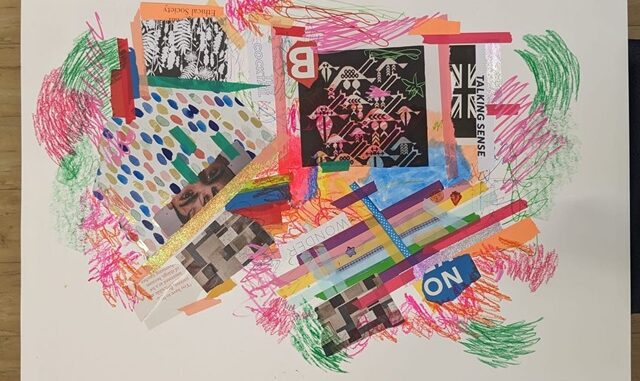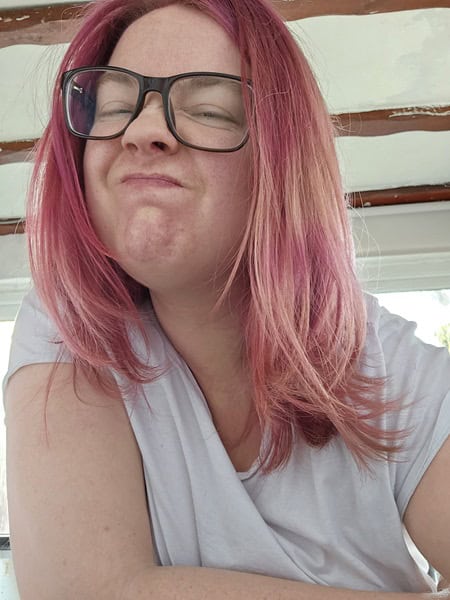
This is the first of three columns from Neurodivergent Friends in Thanet (NDFT) featuring interviews with the group’s directors, each highlighting their contributions to fostering Neurodivergence inclusivity in the local community.
Long standing and chronic isolation is more often than not the everyday struggle of many late-discovered Neurodivergent* (ND) adults, due to stigma, lack of local resources, knowledge and acceptance.
Neurodivergent Friends in Thanet (NDFT) started out of the excruciating and desperate need from local ND adults to find spaces where they could meet their peers, in which they would feel safe to be 100% themselves and find community, support and belonging; for many often for the first time in their life.
Now providing monthly meetups and regular creative workshops catered by and for the local Neurodivergent community, NDFT are making their mark in Thanet, providing Neurodivergent-affirming events, and supporting other local advocate organisation like POW, Looping the Loop or Margate Pride, in their effort for greater inclusive and affirming programmes for the diverse community of Thanet.
As NDFT celebrates their unofficial 2 year anniversary following their very first meetup back in 2022, we caught up with their Co-Directors, who are coming out of their shell to tell us more about their work, dedication, aspirations and vision for the future of Neuro-inclusion in Thanet.
Today we meet with Lucie Chiocchetti/“Lux”, Founder and Co-Director of Neurodivergent Friends in Thanet (NDFT).

Who are you?
I am a 33 year old human, late-discovered Neurodivergent person. I am autistic and an ADHDer. I have always been a very creative person, with an insatiable mind for new ideas and imagination. I love music and the arts, both as a passive and active participant. I am currently on a personal healing and growing journey from past traumas, working towards living a life that is aligned with my needs, values and aspirations for myself, others and the world.
Why NDFT? What led you to create this?
NDFT started from a “sod it I’ll do it myself” moment, when after months of trying to find something resembling what we are now doing, I was consistently facing the inexistent or poorly accessible support I was seeking.
With a bit of background in event management, I DIY-ed the first few events and, overwhelmed by the positive responses and demand for more, I quickly reached out to the community to ask for support. If I was going to make this “a real thing” I needed help, as I was committed to not let this new hyperfixation/special interest become another pit for endless cycles of burnout.
The response was similarly positive, many people raised their hand to offer support and get involved. We worked tirelessly for months to build the foundations of NDFT as we know it today. Some people left in between, others stayed, and in any case, every single person who supported NDFT at one time was an essential contributor to what it is today.
NDFT really was created out of my excruciating and desperate need to find a safe accepting space to meet with peers, with the hope to find belonging and community for myself and my peers.
Where do you see NDFT in 3 years-time? What kind of impact do you want the CIC to have on the local community?
Whether for direct beneficiaries or other organisations seeking support to develop greater inclusion to local NDs in their practice, I dream of NDFT becoming the heart of Neurodiversity in Thanet – a hub where anyone touched by Neurodivergence can find support, understanding, and empowerment.
More broadly, I want us to support the broader local community in better understanding and including Neurodivergent lives locally, supporting Thanet in becoming an example of what inclusion can look like for any community.
In three years from now, I hope that we will have impacted even more people in finding self-acceptance, belonging and community, and that we will see more ND-people proudly advocate for themselves, stand for and support themselves and each other, and be celebrated for their uniqueness and the positives they bring to our local area.
Challenges and Strength: What do you think is our biggest challenge and strength, as an organisation?
I think that our biggest challenge and biggest strength are the same thing: and that’s being 100% Neurodivergent-led as an organisation, i.e., that everyone working as part of NDFT is Neurodivergent.
It’s an everyday challenge requiring a lot of patience, understanding, learning, unlearning and resilience for each of us, to ensure to find our ways to best collaborate and communicate with one another and make it work for everyone involved.
We surely have come across many difficulties throughout our short journey, and we will inevitably encounter way more as we grow.
But it’s a unique strength as each of us have such a unique way of looking at things and understanding the world. When we combine them all together we have a much more intricate, richer and detailed strategic understanding of the world and of our community, and of what we want and can do. Pulling together all our individual strengths creates so much more power internally and enables us to push way more forward than any of us could imagine on our own.
From a professional standpoint, whether it’s to our community or to other professionals that want to work with us and get support in their inclusion work, being a 100% Neurodivergent team means that we can truly cater all our work from a combinations of our Neurodivergent human lived experience point of views, rather than assumptions based on abstract and dehumanised data.
What message would you like to send to individuals who are Neurodivergent or questioning, and may be seeking support or connection?
You belong here. You’re safe here. You have every right to be here. You are not taking someone else’s space or spot. You’re welcome here. Being yourself is always enough.
You can find joy and happiness in being 100% yourself.
I created NDFT out of being desperate to finally find a space where I would feel safe to be myself 100% without ever being judged, with being understood, where I feel I belong for the first time, having always felt like an outsider, and hoping that perhaps, by meeting people who were “like me” I could finally build true friendships with others.
From the first social meetup we did, I, for the first time in my life, felt like I was belonging somewhere with others, that others could see me for who I was, and understood me, and this is the precious healing experience that I wish any Neurodivergent person can ever access, and is why we’re doing what we’re doing.
I know how some might feel anxious about coming to our events for the first time, and to them I really want to say and reassure them that, we are working so hard to create these spaces and events so that they are as truly welcoming and Neurodivergent-affirming, so that even if you’re really anxious, you get to find this space for yourself.
Because you deserve to feel like you belong somewhere, you deserve to feel accepted, you deserve to have a safe space where you get to be unapologetically yourself and find connection and friendships. And we hope to meet you soon.
What advice would you give to someone who wants to support the Neurodivergent community but doesn’t know where to start?
Listen to Neurodivergent voices, proactively ask for support from Neurodivergent people, hire Neurodivergent people to support you with your inclusion work, learn from us and most of all, proactively work on deconstructing your own biases and self-limiting beliefs.
Understand that the inclusion of Neurodivergent people leads to the better inclusion and support of everyone, not just our community.
When it comes to the inclusion work, people often tend to look at it from an outsider exercise that doesn’t touch them directly when they are not directly impacted by the issue they are trying to tackle.
And yet the reality is that by making your practice, your business, your workspace, your space, more inclusive to specific groups of people, you are effectively making it more inclusive to everyone and to yourself.
And this is a mindset shift that I really wish a lot of organisations can make, realising how this inclusion work has the power to impact and heal everyone above and beyond who we are trying to include.
What is a significant lesson you have learned through your work with NDFT?
How annoyingly easy and difficult at the same time it is to create a Neurodivergent affirming organisation!
There are so many very little tweaks and changes that one can do to how they collaborate and how they work together that are so easy and yet have such a huge impact on our ability to maintain working together.
But it’s also very difficult because of how unique and different our individual brains are working.
The biggest lesson learned for me is ensuring to:
1) Always work on growing our self awareness
2) Consistently call ourselves out as soon as we realise something isn’t working, and especially when it’s because of following old habits or rules of mainstream ways of working, or what we’ve been taught what work/good should look like
3) Deliberately work to dismantle these mindsets, enabling ourselves to approach any challenge with curiosity rather than judgement
4) Reject borders or limits of what good should look like and find what works for us.
Don’t get me wrong, it’s so tricky, because there is no model to what we’re trying to achieve as an organisation, and the only model that we have is the one we must work against, because it has so many times and so consistently failed us as Neurodivergent people.
But we are getting there, and this will possibly be our constant exciting challenge in our journey.
How do you hope NDFT will impact the lives of Neurodivergent individuals?
I hope that anyone who comes in contact with us will leave feeling safe, understood and supported. I hope that throughout the work we’re doing with our community, we can empower more ND individuals to find, accept, and advocate for themselves, support each other, love themselves, grow, find joy and belonging in community, that they trust that they are enough and that they are not alone.
A Year of Neurodivergent Connection is ahead…
After a couple of years primarily working on a volunteering basis and DIY solutions, the NDFT team wants to solidify their foundations. They are excited to launch their first crowdfunding campaign on Spacehive [https://www.spacehive.com/ndft-connection-year] where they aim to raise up to £26,000.
This campaign aims to fund a whole year of activities, including NDFT’s famous monthly social meetup, a new monthly coffee morning, and other exciting events, to continue growing sustainable support for the growing Neurodivergent community of Thanet.
A “neurodivergent” person is someone whose brain processes information in a way that is not typical of most individuals.

